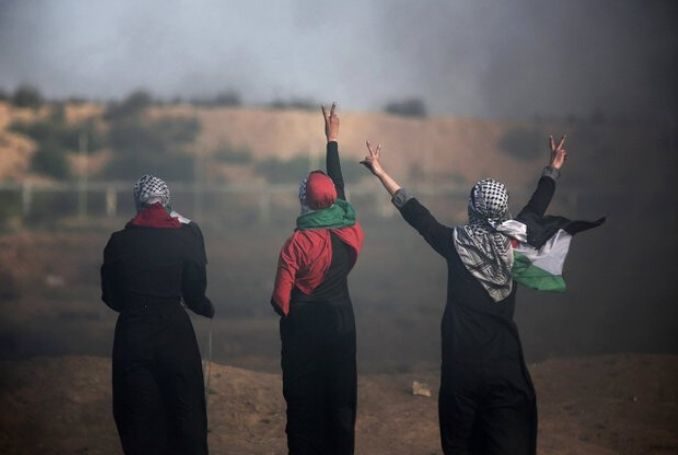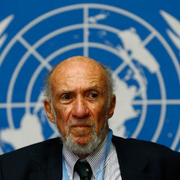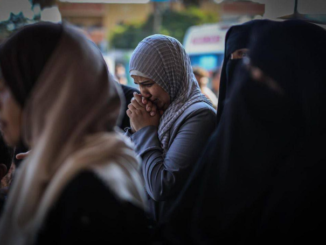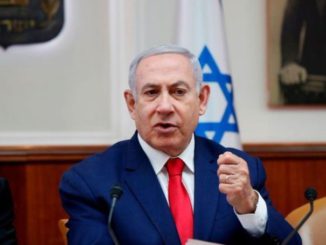
By Richard Falk
Looking upward, the sky above Palestine has darkened, but whether portending a storm or nightfall is uncertain.
If de jure annexation will go forward, then the sky is likely to emit thunder and lightning. When the storm passes, nothing will seem changed. Annexation is being discussed as if a game changer yet ‘annexation’ has already taken place in the form of settlements, the separation wall, denial of building and residence permits to Palestinians living in Area C, and long-affirmed Israeli sentiments of biblical entitlement solidified by continued tradition of affirming ‘Palestine’ as ‘the promised land’ of the Jewish people. All that changes is the commitment, long laughable, a to a two-state solution that allowed governments and the UN to claim that they had not renounced their commitment to peace based on a territorial compromise between the two peoples although conditions on the ground constantly reinforced by Israeli implementations of territorial ambitions made such an approach delusional to the point of irrelevance. Any yet the Palestinian Authority and liberal Zionism in America cling uncritically to the two-state goal by refusing to look at the constantly accumulating facts on the ground that long ago made an Israeli one-state outcome all but inevitable even if packaged as ‘the deal of the century,’ and rather absurdly purporting to present this poisoned chalice as of benefit to the Palestinians as well as ‘the gift of the century’ to the Israelis.
What is the nature of this gift? It is a strong-armed attempt to confer legitimacy on decades of unlawful Israeli expansionism carried on while the U.S. winked in public, and smiled in private. What failed as partisan diplomacy during the Clinton/Bush/Obama presidencies is now with only the thinnest of disguises unveiled as a geopolitical initiative. It is not only Trump + Netanyahu/Gantz that makes this an opportune moment to crush Palestinian resistance and struggle. Such an initiative is also helped by the regional confrontation of the Arab Gulf countries with Iran, which makes the governing Arab regimes willing to throw the Palestinians under the nearest bus, despite overlooking the abiding solidarity of the Arab people with liberating the Palestinian people from their prolonged and insufferable ordeal. For what ends? To please Washington, and to join forces with Israel to induce Iran to withdraw from any active role in regional policies, or more ambitiously, to achieve regime change in Tehran.
Will this storm, if it materializes, alter the present play of forces? It seems doubtful. Palestinians, may be discouraged by these dark clouds hovering over their collective destiny, but their perseverance and resilience has been demonstrated over and over again. Of course, nothing should be taken for granted, and if Israel goes ahead with its provocation, the Palestinian response will be watched closely as an indicator of the intensity with which la lucha continua. It is possible that Israel will back down on annexation, at least temporarily, because outsiders, including Jordan, the EU, the UN, liberal Zionism in the diaspora do not want to legalize the facts on the ground just as they do not want to challenge them. Legalization will make the two-state delusion no longer credible, and then what? A reluctant acceptance of the lost cause scenario, acknowledging that the Trump/Israel game plan has prevailed, and that the long effort to find a compromise has failed. But will legality confer legitimacy?
Here is where the split between the top down perspective of political elites will diverge further from the bottom up approach of transnational movement politics. The top down approach will grimace, but cave in, implicitly accepting ‘the new normal’ of annexation. The bottom up approach is likely to be energized, insisting that these moves coordinated between Washington and Jerusalem have no relevance to the status of Palestinian grievances, and merely point to the criminalization of this move to acquire sovereign rights over occupied Palestinian territory taken by force in the 1967 War, a territorial claim unanimously rejected in the midst of the Cold War by the UN Security Council in Resolution 242, which also mandated a diplomatic path to peace in Resolution 338 by a 14-0 vote, often reaffirmed in subsequent UN resolutions.
Yet might it be nightfall, a long prelude to a new dawn. The sheer injustice of such arrogant geopolitics may be a red line, which when crossed, results in real changes in the balances of forces that will turn out to be helpful for the Palestinian struggle. It is this prospect that has led some stalwarts of the Israeli security establishment and several of the most militant Zionists to break ranks, opposing annexation, at least now for a series of tactical reasons—provoking Jordan, troubling liberal Zionists, alienating Europe, arousing the Arab street, weakening bipartisan support in the U.S., strengthening the BDS Campaign, discrediting the 2018 IHRA (International Holocaust Remembrance Alliance) definition of ‘anti-Semitism,’ ending collaborative relations with the Palestinian Authority, promoting Palestinian unity efforts, undermining the anti-Iran coalition, and generating a Third Intifada. If some of these reactions occur it will produce a new stage of struggle, which could even lead toward increasing boycotts directed at Israel, and greater advocacy of sanctions, which could mean a loss of legitimacy rather than its gain, and an Israeli search for a better alternative.
And what is a better alternative? This question can only be answered by the Palestinian people through their authentic representatives. Even so, there are certain preconditions that must be met if the lessons from the past are to be learned by the mapmakers of the future. The most important lesson involves the recognition that Israel’s security has long rested on an apartheid framework of Israeli domination of the Palestinian people as a whole, which means that apartheid extends beyond occupation to encompass refugees, involuntary exiles, and the non-Jewish minority in Israel. It resembles South African apartheid as resting on the subjugation of one race by another for purposes of sustaining domination in a manner violating international criminal law by the International Convention on the Suppression and Punishment of the Crime of Apartheid (1973), and listed as a Crime Against Humanity in Article 7(j) of the Statute governing the International Criminal Court.
By ‘a new dawn’ is meant an Israeli change of view as to identity and national security in response to a changed perception of how to improve their overall situation domestically and internationally. There was no moral awakening among the Afrikaner leadership that led to the unthinkable release of Nelson Mandela from prison as preparatory to negotiating the dismantling of the apartheid regime of control established to control the majority African population. It was a recalculation of interests on the part of the white minority, which went against the assumptions prevailing at the time that the only way for the white domination to persist was by maintaining apartheid and the only way to create peace within and without was by ending apartheid. Israel’s situation is different, reflecting the Zionist imperatives of a Jewish demographic majority, a democratic political structure, and an ethnic identity that is coupled with a universal and exclusive right of return. These imperatives meant that direct control needed to be combined with ethnic cleansing and a politics of fragmentation. Israel’s early challenges were formidable, maintaining such control and dispersion at a time when European colonialism was under attack throughout Asia and Africa, and collapsing despite superior battlefield capabilities. In this respect, Israel has so far succeeded in establishing a settler colonial state of the Jewish people, and has been able to gain diplomatic legitimacy outside its region and through admission to international institutions, including the United Nations.
On the basis of this understanding, it is obvious that ending the occupation would not bring a sustainable peace because its formula of ‘land for peace’ ignores, or at best marginalizes more than five million Palestinian refugees and exiles. Even if that stinking fish were to be politely ignored, or minimized, as it was during the Oslo ‘peace process’ or by the UN ‘roadmap,’ it would not be possible to actualize so long as the settlers and their armed settlements remained on the best land in the territory set aside for an independent Palestinian state. It is supremely unlikely that settlements on this scale could be dismantled or remain but demilitarized and under Palestinian security control.
Ending apartheid is the only way to end Palestinian resistance, and given the psycho-political realities of the post-colonial world, the fierceness of such resistance will occasion cycles of intensifying harshness of Israeli oppressive control. This has been the meta-narrative of the conflict since Israel established statehood and Palestine endured the Nakba, as event and process. And if apartheid is ended, transition to a peaceful future would require some formula for a shared destiny based on equality and a reckoning with the past to heal wounds. It is difficult, verging on impossibility, to envisage such a future. Yet anything else dooms both peoples to a unjust social, political, and legal order that can only be sustained or challenged by continued modalities of control and resistance. The Palestinian and Jewish peoples deserve more humane prospects, and let us hope that the annexation debacle will open this gate that has been kept locked far too long.
– Richard Falk is Albert G Milbank Professor Emeritus of International Law at Princeton University and Research Fellow, Orfalea Center of Global Studies. He was also the United Nations Special Rapporteur on Palestinian human rights. Visit his blog. He contributed this article to The Palestine Chronicle.

– Richard Falk is Albert G Milbank Professor Emeritus of International Law at Princeton University and Research Fellow, Orfalea Center of Global Studies. He was also the United Nations Special Rapporteur on Palestinian human rights. This article originally appeared on his blog.







